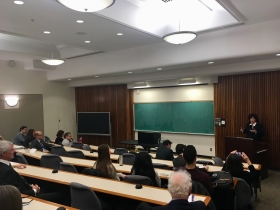By Peter Boisseau
Multiculturalism is an important social goal but not very useful as a legal mechanism, Justice Daphne Barak-Erez of the Supreme Court of Israel told an audience at the 2017-18 David B. Goodman lecture.
Drawing examples from both Canada and the Israel, Barak-Erez said there are many circumstances where multiculturalism leaves too many unanswered questions about who it protects, when and to what degree.
This is largely because the term “multiculturalism” tends to be used loosely and for very different situations, making it difficult to determine legal standards or definitions.
“Rather than using the concept of multiculturalism very broadly and generically, perhaps we should change the focus by using clear anti-discrimination laws,” said Barak-Erez, a former visiting professor at U of T.
Protection of individual rights might be more effective under straightforward legal mechanisms, such as class action lawsuits, she added.
Ideally, the goal of multiculturalism is to recognize different cultures in a way that makes the state responsible for protecting them.
But that ideal often breaks down over fundamental questions about how far that duty extends. Are all cultures equal, or are there limits? How should cultures be defined? Is multiculturalism only about protecting minorities?
For example, both Canada and Israel each have two official languages, but that really only represents a kind of partial multiculturalism.
“In both systems, we don’t see equality for other languages. They are accommodated, but they don’t enjoy the same status,” if for no other reason than practical considerations about the cost and impact.
Barak-Erez said she was “very humbled” to speak to a Canadian audience about multiculturalism, a concept which is also important to Israel, although in ways that are sometimes very different.
In Canada, public debate about multiculturalism could be said to have started with finding accommodation for existing groups and cultures such as Francophone and Indigenous populations, then evolved more recently to focus on immigrants and religious minorities, she said.
In Israel, “multicultural” debates often revolve around the competing interests of religious and secular groups within the majority Jewish culture, not the rights of minority groups.
“Some in Israel have even made the argument that secular Judaism is a separate culture and this might have legal implications.”
The complexity of Israel’s multicultural society has left its courts wrestling with such nuances on a range of issues.
A few years ago, the Supreme Court of Israel ruled women and men could not be made to sit separately on buses used by ultraorthodox groups. But those buses were allowed to open both their back and front doors at the same time for boarding so men and women could sit apart if they chose.
Courts in Israel have also sometimes turned to a form of “regionalism” to solve thorny issues of religious freedom, said Barak-Erez.
Recently, the Supreme Court of Israel upheld a bylaw allowing businesses in Tel Aviv – the country’s most secular city – to open on Shabbat, the Jewish sabbath.
Similar rulings in the past have also allowed such things as limited sales of pork products in more secular communities. But regionalism as a solution for multicultural protection comes at a price.
“When Tel Aviv opens its supermarkets on Saturdays this may have implications for other communities as well,” she said.
“And while regionalism may also tend to help religious communities that prefer to live together, it may also have negative effects on social cohesion and incentives for everyone living together in a multicultural environment.”
Other debates have involved how to best give a voice to individuals within groups that are not united on an issue. In one case, the courts certified the right of a feminist group to represent ultraorthodox women in a class action suit against a radio station that bans female voices from its programming.
Law student Haim Abraham asked Barak-Erez how legal questions about multiculturalism become focused on one issue over another, such as the radio station.
“I think the answer is connected to the idea of externality,” she replied. “If women are excluded from speaking in one place, it has implications for the public arena in general.”
In the same vein, some issues of multicultural accommodation evolve and change over time, she said, responding to a question from law student Omar Said about how exemptions from military service are determined.
Exempting for some ultraorthodox students was not a big deal when they numbered only a few hundred back in the 1950s, for example, but now that there are thousands, “the exemptions have become a social concern.”
The D.B. Goodman Fellowship was established in memory of the late David B. Goodman, Q.C. of Toronto by members of his family, friends and professional associates with the intention of bringing to the law school, on an annual basis, a distinguished member of the practising bar or bench for a few days of teaching and informal discussions with the student body and faculty.

